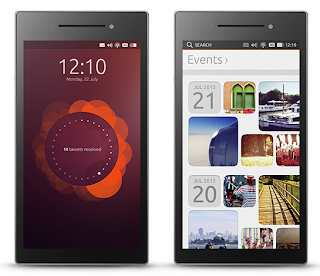 |
| The Ubuntu Edge |
Keep reading after the break
Two years ago I wrote a short article on the future of computing that was right on the money (although I talked about a tablet, not a smartphone). The Ubuntu webtop has been around since early 2012 so the idea is nothing new, although so far there haven't been any official devices running Ubuntu mobile.
The other idea behind this device is the concept of purchasing a device that is ahead of the game in terms of specs. This is definitely something that appeals to me, and probably a lot of other Android geeks out there but are there enough of us with the disposable cash for this?
For those interested the hardware specs proposed are:
- Constructed of a single piece of metal
- 4.5" screen that has great colour accuracy, brightness and dynamic range but won't be much over 300ppi (so likely 720p)
- 4GB+ RAM
- 128GB internal storage (this one is very interesting)
- Sapphire crystal screen so only diamonds can damage it
- A battery using silicon-anode technology
- dual-LTE so you can use 4G anywhere in the world
- the "fastest available multi-core processor"
I truly think this is a brilliant idea and would love to work in a place that supported using devices like this, yet I don't think Canonical will succeed with this campaign. Why not? you might ask, well the answer is very simple - money.
If Canonical need $32 million USD to
kickstart the development of this device they are already starting off on the
back foot. By comparison the incredibly successful Pebble smartwatch Kickstarter managed to raise over $10 million USD and is the largest kickstarter to
date moneywise. The largest Indiegogo campaign
was that of the Tesla
Museum which raised
$1.3 million USD recently.
The first day of the Edge campaign was quite successful due to a one day deal where a $630 USD pledge would gain pledgers an Ubuntu Edge device on release, now a pledge of $830 USD is required. This means another 34,000 people need to be willing to hand over $830 USD for the campaign to succeed.
To put it simply, I don't see how they can raise the amount required.
Another thing I question is the 'indie' status of Canonical, a company with over 500 staff members in more than thirty countries. In a 2008 interview, CEO Mark Shuttleworth said that Canonical was not yet profitable, but aimed to reach profitability within 5 years. Perhaps this is a play at gaining market share in the rapidly growing mobile space (although they deny it) but I question why they didn't go down the normal route of finding investors with cash up front instead of attempting to crowdfund as an 'indie' project.
Ultimately it's up to the market to decide whether or not this funding campaign is a success, or whether it is a failure and nothing I can say or do will change that.
Ultimately it's up to the market to decide whether or not this funding campaign is a success, or whether it is a failure and nothing I can say or do will change that.

No comments:
Post a Comment